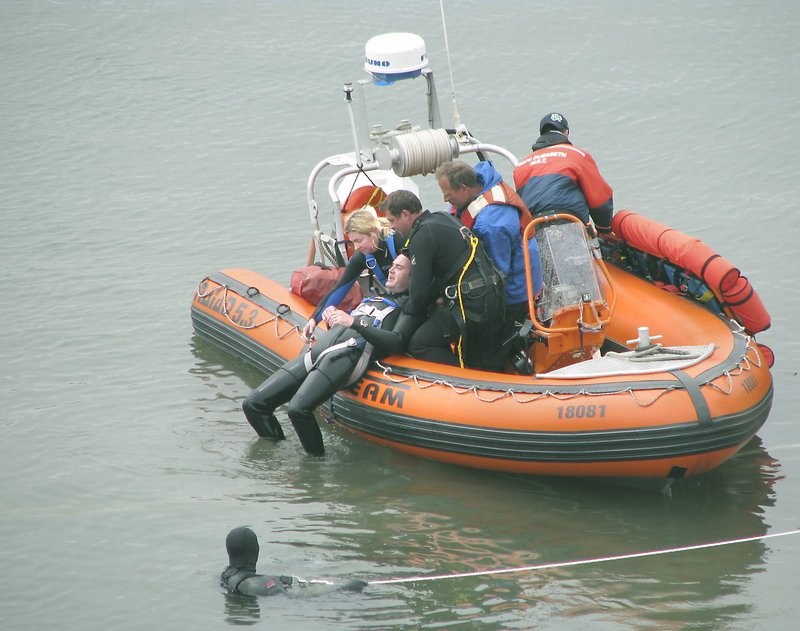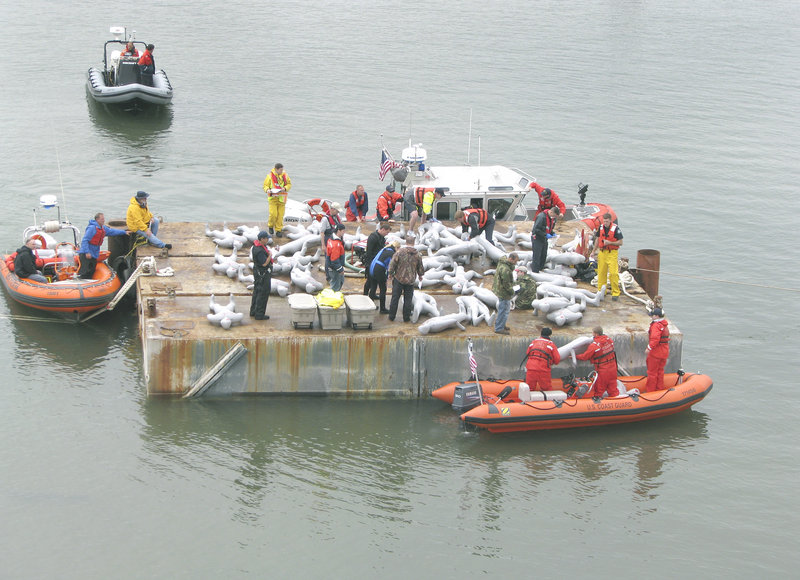PORTLAND — Shortly before 10 a.m. Saturday, a gravelly transmission emanates from emergency radios describing a reported plane crash south of the Veterans Memorial Bridge. There is no sign of a fire, but there are “74 souls on board,” says the dispassionate voice.
With that initial report, city, state and federal agencies launched into action, attempting to go through the motions that they would if a plane had really crashed.
Soon, a portable emergency command post was set up on the northbound lanes of the Veterans Memorial Bridge, shutting them down to traffic.
East of the bridge, water rescue teams began arriving. Soon, nine boats are searching the shore and making trips to and from a barge that represents the intact fuselage of the Continental Express Q-400 that had gone down as it approached the jetport.
Three Coast Guard rigid inflatable boats ferried away fake, inflatable passengers, and a Casco Bay Lines ferry was pressed into service for use as a staging area.
“We don’t deal with situations of this size every day so it’s good to train,” said police Lt. Gary Rogers, who took on the role of public information officer during the drill.
The Federal Aviation Administration requires the Portland International Jetport to hold a full-scale emergency drill once every three years. The drill is designed to test emergency response and identify weaknesses in the plan before a real disaster hits.
This drill was designed by city, state and jetport officials attempting to recreate some of the challenges faced in January 2009 when a US Airways pilot made an emergency landing on the Hudson River.
The drill got going a little late because the Portland fireboat had an emergency medical call on Peaks Island, said police Lt. Janine Roberts, who was observing the drill, not participating in it.
Overlooking the Fore River from the Veterans Bridge, Roberts said challenges had materialized. The boats responding were unable to communicate directly with the emergency operations center, but had to radio their supervisors, who relayed the information over separate channels.
The participants in Saturday’s drill took their training exercise seriously. Monitoring the response were representatives of the National Transportation Safety Board and the Federal Aviation Administration.
All aspects of the emergency response are critiqued, but Saturday’s drill included a special emphasis on disseminating information to the public.
Getting accurate information to the public — and responding quickly to inaccurate rumors — is important.
“We’ve never tested this function before and it’s very important,” said Nicole Clegg, spokeswoman for the city of Portland.
Rogers provided the media with a telephone number for Continental Airlines that passengers’ family members could call for information.
Within an hour of the drill’s start, a family support center was set up at the Ocean Gateway terminal.
Firefighters and several ambulances were on hand at the Maine State Pier to treat and transport the inflated casualties.
At 11:30 a.m., Fire Department Deputy Chief Michael Shutts, incident commander, held a news conference with Coast Guard Commander Phil Thorne and jetport manager Paul Bradbury at the South Portland police station, which was serving as the Joint Information Center.
They confirmed fatalities and that nobody remained in the wreckage. They said they remain in a response mode and have no information on the cause of the crash. An oily sheen had spread over the water.
Print and television reporters who volunteered to participate in the drill peppered them with questions.
Clegg said the drill is paid for by the jetport, though many of the participants are volunteers or were working already scheduled shifts.
The drill was not a surprise for any of the participants, though it also was not scripted beyond the basic scenario and agencies’ own plans for responding to certain situations.
Afterward, participants gathered in small groups for what Roberts called the “hot wash,” a debriefing right after the event to assess each components’ response.
Staff Writer David Hench can be contacted at 791-6327 or at:
dhench@pressherald.com
Send questions/comments to the editors.




Success. Please wait for the page to reload. If the page does not reload within 5 seconds, please refresh the page.
Enter your email and password to access comments.
Hi, to comment on stories you must . This profile is in addition to your subscription and website login.
Already have a commenting profile? .
Invalid username/password.
Please check your email to confirm and complete your registration.
Only subscribers are eligible to post comments. Please subscribe or login first for digital access. Here’s why.
Use the form below to reset your password. When you've submitted your account email, we will send an email with a reset code.